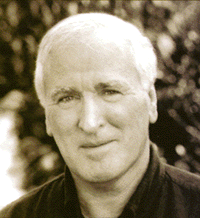|
Scientific Music Medicine |
| Home • Site Map • Research • Reports • Intern. Experts • Music Preparations • Fundamentals • Store • Contact |
| MEDICAL EXPERTS |
| About the Classical Composer and Musicologist Peter Hübner & the Medical Resonance Therapy Music® |

Dr. James Lynch
(www.lifecarehealth.com)
is a board member of The American
Institute of Stress, on the staff of the
Cardiovascular Rehabilitation
Program at Lifebridge Health, and
Director of the Life Care Health Centre
in Baltimore, Maryland, USA. For more
than 30 years, he served on the full-
time medical school faculties of the
Johns Hopkins University, the
University of Pennsylvania,
and the University of Maryland.
In 1977, he became the first to
document how loneliness
contributed to all forms of premature
death, especially from heart disease.
His much publicised and
oft-cited best-seller:
“The Broken Heart: The Medical
Consequences of Loneliness”,
caused a social and medical stir both
wide and deep, and was translated
into 10 languages. Dr. James Lynch
is held by many leading medical
experts around the world as a pioneer
and visionary in the field of
mind/body/interpersonal health.
In his latest ground breaking work
“A Cry Unheard. New Insights into
the Medical Consequences of
Loneliness, Lynch sets forth a major
hidden cause of heart disease, the
industrialised nations’ leading killer,
and recommends a provocative
set of solutions.
Dr. James Lynch
“During the past two decades, Peter Huebner’s ‘Medical Resonance Therapy Music’ has been demonstrated effective in helping to alleviate pain, insomnia, anxiety, headaches, and other stress-related complaints in a variety of hospital and out-patient settings.
This remarkable German musicologist and classical composer developed a sophisticated, computerised, digital music laboratory to create compositions based on Pythagorean precepts.
Although he is best remembered as a mathematician, Pythagorus was also an accomplished physician, astronomer, and musician. He taught that each of these disciplines, as well as all of nature, were governed by laws of harmonious proportion that were interrelated in some concordant fashion. He coined the term ‘cosmos’ to describe this orderly and harmonious universe, where everything could be reduced to mathematical principles. In Pythagoras’ day, both music and medicine were considered to be branches of mathematics, as well as an art or science, and pleasing music or good health required maintaining harmonious relationships. Since everything in the cosmos was interrelated, knowledge gained from a greater understanding of mathematical principles in the microcosm of music could be utilised to restore disruptions in balance and harmony that were responsible for different diseases.
In the most general sense, our approach to the treatment of heart patients encompasses a similar view, one in which we attempt to bring patients back to what I believe is a biological state of ‘harmony’ with the rest of their living world.”
This remarkable German musicologist and classical composer developed a sophisticated, computerised, digital music laboratory to create compositions based on Pythagorean precepts.
Although he is best remembered as a mathematician, Pythagorus was also an accomplished physician, astronomer, and musician. He taught that each of these disciplines, as well as all of nature, were governed by laws of harmonious proportion that were interrelated in some concordant fashion. He coined the term ‘cosmos’ to describe this orderly and harmonious universe, where everything could be reduced to mathematical principles. In Pythagoras’ day, both music and medicine were considered to be branches of mathematics, as well as an art or science, and pleasing music or good health required maintaining harmonious relationships. Since everything in the cosmos was interrelated, knowledge gained from a greater understanding of mathematical principles in the microcosm of music could be utilised to restore disruptions in balance and harmony that were responsible for different diseases.
In the most general sense, our approach to the treatment of heart patients encompasses a similar view, one in which we attempt to bring patients back to what I believe is a biological state of ‘harmony’ with the rest of their living world.”
James J. Lynch
In his latest ground breaking work:
“A Cry Unheard.
New Insights into the
Medical Consequences of Loneliness”
In his latest ground breaking work:
“A Cry Unheard.
New Insights into the
Medical Consequences of Loneliness”
With kind permission of AAR EDITION INTERNATIONAL
© 1998- SCIENTIFIC MUSIC MEDICINE | Contact
Subject to change in the interests of scientific advancement.
© 1998- SCIENTIFIC MUSIC MEDICINE | Contact
Subject to change in the interests of scientific advancement.